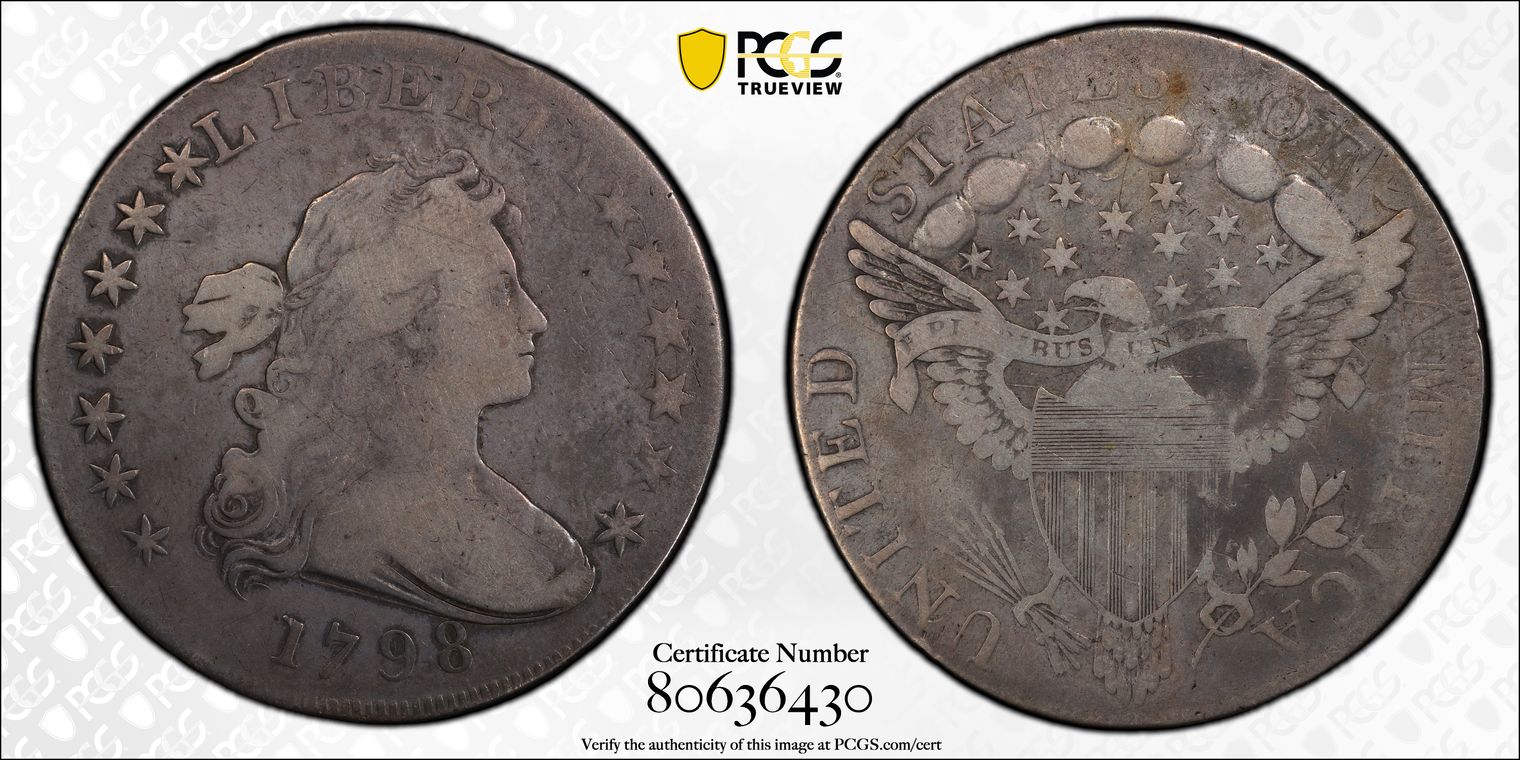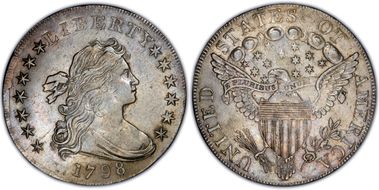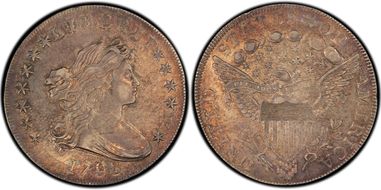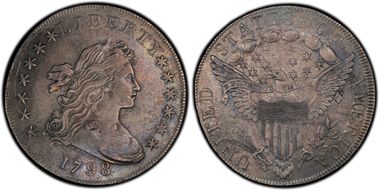1798 $1 BB-101 VG8 认证号80636430, PCGS号40017
拥有者评论
B-17, BB-101, 5 Lines, Pointed 9, R.5 EX: The Palos Verdes Collection sold via Heritage in January, 2017. This scarce variety is described on page 39 of my 1950 first edition of M. H. Bolender's book, "The United States Early Silver Dollars, From 1794 to 1803". Quoting, now: "1798 B-17 (H-17) Excessively rare. Hazeltine's was only good, the only one he ever found. The author's (Bolender) is fine, and the only one he has seen. Rarity 7." There is a chance that my example was a part of something called The Economite Hoard, due in large part to the dark toning consistent with those many tens of thousands of silver coins, mostly half dollars, in that stockpile, dated 1794 to 1836. A great portion of the cache, including early silver dollars, was sold to the prominent numismatic dealer and cataloger, Captain John W. Hazeltine soon after discovery in 1878. I like to imagine my well worn dollar was part of that Hazeltine trade, leading then, to his cataloged public auction, in 1881, of this very rare Hazeltine variety, H-17. Later, B-17, BB-101. Note: The coin’s value has doubled in the last three years, from $1500 (2021) to $3000 (2024).
专家评论
Q. David Bowers
The following narrative, with minor editing, is from my "Silver Dollars & Trade Dollars of the United States: A Complete Encyclopedia" (Wolfeboro, NH: Bowers and Merena Galleries, Inc., 1993). Note: the Notable Specimens list should be used with caution - it has been updated in my 2013 edition of "The Encyclopedia of United States Silver Dollars 1794-1804."B-17. H-17.
OBVERSE 5: Wide date, the 8 just touching bust. Date is over 11.5 mm. across at bottom widest part. Upper star on left very close to L, and upper star on right is near Y. Second star ray points slightly right of denticle. The denticles to left of date are irregular.
Obverse die used to strike 1798 BB-101 only.
REVERSE F: See description under 1798 BB-96. Large Letters reverse, 5 lines in each vertical shield element. BB-101 is from an later state (Die State V as described under BB-96). On the BB-101 variety some berries appear without sterns. Only 10 arrows, the two sticks seen on BB-96 having now been removed.
The reverse die was used to coin BB-96 dollars, reground and used to coin BB-101 Die State I dollars.
Reverse die used to strike 1798 BB-96 (early and late states), BB-101 (latest state).
DIE STATES:
Die State I: Perfect obverse die without injuries. The Spies Collection (Stack's, 1974), "Bolender-17a" from "finished dies" without obverse defects, may be Die State 1. Walter Breen suggests (in his Encyclopedia, Breen-5379) that only one specimen may be known of this die state.
Die State II: Most known specimens have a readily visible die injury at Miss Liberty's left shoulder and another at the reverse field area near the stars. This is the state known to Bolender. Die crack just beginning over I of AMERICA. Equivalent to Die State V of 1798 BB-96. This is the usual die state of BB-101 seen.
Die State III: As preceding, but obverse die cracks along leftmost star rays (stars 2 to 5) and denticles on left side. Cf. Blevins Collection (Superior, 1988): 3680.
Die State IV: As preceding, but reverse crack now extends through letter R and into the field at the lower left of the letter. Cf. 1975 ANA (Superior): 876.
Die State V: On the latest die state, the die swells at the left obverse field and at the corresponding area of the reverse.
COLLECTING NOTES: 1798 BB-101 is another rare variety. Probably about 70 to 120 are known, most of which are well circulated. The average grade of F-19 is one of just a few to dip below the VF category. An AU or Mint State coin, if such could be found, would be regarded as a landmark item.
Haseltine's was only Good, the only one he ever found. In his 1881 Type-Table, he used his favorite adjective, "excessively," which he used excessively, to describe the rarity of this variety. Bolender only ever saw one, the VF coin that landed in his collection. The fact that numerous specimens have appeared since then, is testimony to the potential "out there" for locating still more examples of erstwhile and present rarities. Only a small number of 1798-dated dollars in numismatic circles have ever been attributed to Bolender numbers.
NOTABLE SPECIMENS:
Miller Specimen. EF-45. Warren Miller Collection. Die State III.
Smith Specimen. EF-40. H.P. Smith. Col. E.H.R. Green Collection. O. K. Rumbel Collection. ANA Convention Sale, New Netherlands 38th Sale, 1952: 3133. About EF. "A beautifully toned coin with considerable lustre, believed to be one of the three finest known specimens.". Bolender, April 1953: 277. A.J. Ostheimer, 3rd Collection, Lester Merkin, 1968: 259. "EF, much frosty lustre, delicate pastel toning."
Hollinbeck-Kagin Specimen. EF-40. Hollinbeck-Kagin Sale, June 1970: 612. "EF with lustre, lovely patina."
Boyd Specimen. EF-40. F.C.C. Boyd Collection, 1945. Bolender Collection, 1952. Dr. Charles Ruby Collection. Gilhousen Collection, Superior, 1973: 1236. "EF, lustrous, iridescently toned."
Higgins Specimen. EF-40. Bowers and Merena, Lloyd M.Higgins, M.D. Collection, 1988: 2216, VF-35 to EF-40 (ANACS 40/40). "Condition Census, even medium silver gray toning on both surfaces. Nice detailing visible on Liberty’s hair on the obverse and the eagle's wings and shield lines on the reverse. Obverse die sinking, bulge beneath Liberty’s breast and behind her head. Pronounced crack visible running from above the first star to the rim above the seventh, accounting for the rarity of the variety. Plainly, the crack and bulging was severe enough to retire the die from service soon after its initial use."
Stirling Specimen. VF-30. Frank M. Stirling Collection, Heritage, February 1986:1335. "Pleasing russet brown toning scattered throughout."
Blevins Specimen. VF-30. Superior, H.W. Blevins Collection, 1988:3670. "Medium gunmetal gray with some faint golden undertones at the centers. Very well struck for the variety with full hair detail and sharp feathers; there is a bit of weakness at the right side of the shield. Die injury at Liberty's shoulder which has made the left obverse (and the corresponding reverse) fields appear quite swollen."
Willasch Specimen. VF-25. Superior, H. Roland Willasch Collection, 1990:493. "Steel gray and original with a single small mark above the bow of Liberty. Excellent rims and fields otherwise and truly a charming example of this scarce variety. Late obverse die state with cracks visible at the outer left star points and the dentils heavily lapped down. The reverse has a small crack from rim to I of AMERICA."
Baldenhofer Specimen. VF-20. W.G. Baldenhofer. Lester Merkin's Ostheimer Collection Sale, 1968. Stack's, W. Earl Spies Collection, 1974:80. "EF, mint lustre and delicate iridescent toning.". 1975 ANA Convention Sale, Superior. Yolanda Gross Collection.
PCGS #
40017
设计师
Robert Scot
边缘
Lettered: HUNDRED CENTS ONE DOLLAR OR UNIT
直径
40.00 毫米
重量
27.00 克
铸币数量
287536
金属成分
90% Silver, 10% Copper
更高评级数量
9
评级较低的钱币数量
0
地区
The United States of America
价格指南
PCGS 数量报告
拍卖 - PCGS 评级的
拍卖 - NGC 评级的























